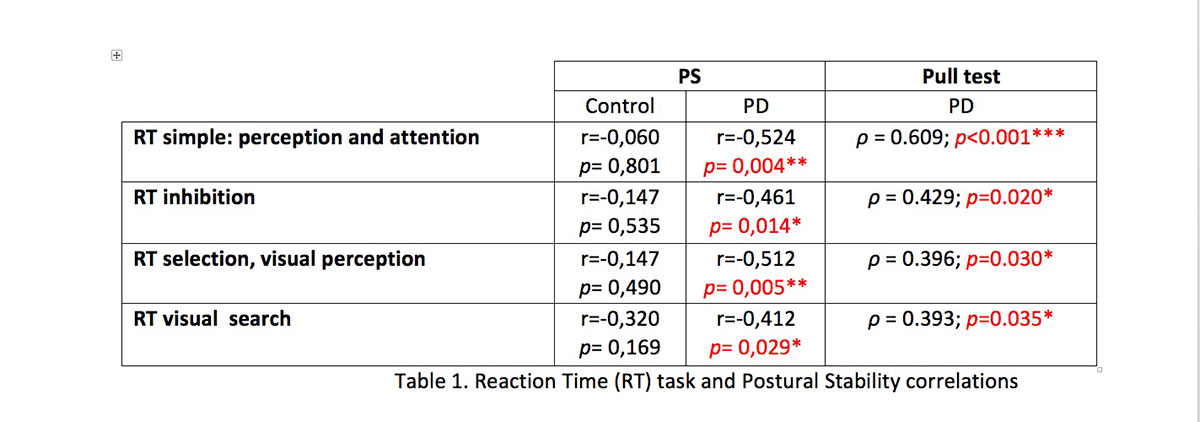Session Information
Date: Tuesday, September 24, 2019
Session Title: Classification of Movement Disorders
Session Time: 1:45pm-3:15pm
Location: Les Muses Terrace, Level 3
Objective: To measure in PD patients with normal cognitive screening the clinical and instrumental measures of postural stability (PS) and analyze their relationship with cognitive processing speed (CPS) measured with computerized a reaction time task (RT).
Background: Balance alterations in PD are late manifestations but with implicit great morbidity. It is usually assessed through the pull test maneuver of MDS-UPDRS III, this technique is subjective and has shown low correlation with the risk of falls [1]. PS is determinant for the staging of patients on the HY scale [2]. Some studies suggest that cognitive functions may be related to walking and the degree of motor involvement [3].
Method: 20 controls and 30 PD were recruited (no differences in age, sex and education years). Most PDs were located in stage II of the HY, with an average MDS-UPDRS III of 14.5. All the participants performed MoCA (no differences either), stability limits measured through the Biodex® platform and four computerized RT task with an increasing level of cognitive requirement with a previous purely motor task using the same system.
Results: There were no differences between the 2 groups in the motor test p= 0.25. There was no relationship between the different RT tasks and the stability limits in control group, but there was an statistical significant relationship between all RT tasks and stability limits in PD patients. Surprisingly there was also a significant relationship between all the different RT tasks and postural stability evaluation through the pull test of MDS-UPDRS III [table 1]
Conclusion: CPS is directly related to PS in PD. The measurement of the CPS could be used as a screening to further perform an instrumental posturography in order to detect an increased risk of falls. Cognitive measurements should be considered to complement HY staging.
References: 1 Munhoz, R. P., et al. (2004). Evaluation of the pull test technique in assessing postural instability in Parkinson’s disease. Neurology, 62(1), 125-127 2 Götz., et al. (2004). “Movement Disorder Society Task Force report on the Hoehn and Yahr staging scale: status and recommendations”. Movement disorders, 19 (9), 1020-8. 3 Pal,G., et al. (2016). Global cognitive function and processing speed are associated with gait and balance dysfunction in Parkinson’s disease. Journal of neuroengineering and rehabilitation, 13(1), 94.
To cite this abstract in AMA style:
J. Andreo Jover, A. Arroyo Ferrer, P. López Serrano, J. Periañez, M. Rios-Lago, G. Lubrini, JP. Romero Muñoz. Relationship of cognitive processing speed with postural stability in non-demented Parkinson’s disease patients [abstract]. Mov Disord. 2019; 34 (suppl 2). https://www.mdsabstracts.org/abstract/relationship-of-cognitive-processing-speed-with-postural-stability-in-non-demented-parkinsons-disease-patients/. Accessed April 20, 2025.« Back to 2019 International Congress
MDS Abstracts - https://www.mdsabstracts.org/abstract/relationship-of-cognitive-processing-speed-with-postural-stability-in-non-demented-parkinsons-disease-patients/

